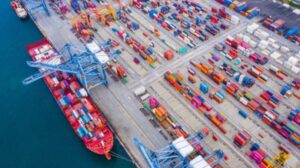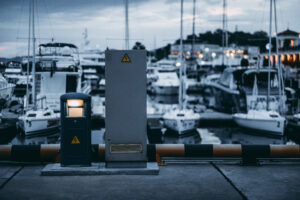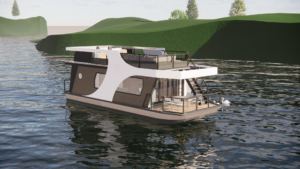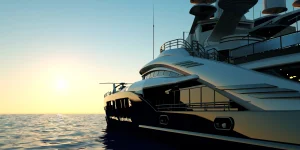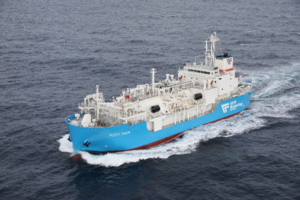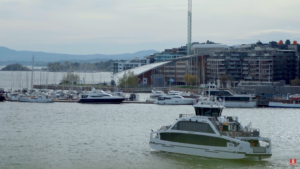Industry News
RINA and Lloyd’s Register found the Nuclear Energy Maritime Organization (NEMO)
With 11 other founding members, RINA and Lloyd’s Register have created the Nuclear Energy Maritime Organization, a group of companies with a common interest in developing nuclear energy solutions for the maritime sector.
The other founding members are HD KSOE, CORE POWER, BWXT Advanced Technologies, TerraPower, Onomichi Dockyard, Westinghouse Electric Company, VARD Group, Bureau Veritas, and JEIL Partners.
By bringing together stakeholders with relevant expertise, NEMO’s mission is to help national and international regulators create appropriate future-oriented standards and rules for the deployment, operation and decommissioning of floating nuclear power enabling floating nuclear power solutions to be deployed with the highest standards of safety, security, and environmental justice.
RINA and World Bank Group to support sustainability in Indonesia’s maritime transportation
Inspection, certification and engineering consultancy RINA has secured a contract with The World Bank Group to support the Ministry of Transport of the Republic of Indonesia in promoting an environmentally and climate-sound development in Indonesia’s port infrastructures and maritime transportation.
Funded by the Korean Green Growth Trust Fund (KGGTF), the World Bank’s activity on ‘Greening the Maritime Transport Sector in Indonesia to Promote an Environmentally and Climate-Sound Development’ aims to support the Indonesian Ministry of Transport to ensure economic growth is balanced with ecological sustainability within ports and the maritime transportation sector.
Leading Indonesia toward a green energy transition
The project will study the ships, shipping and port sectors to provide a roadmap for the Indonesian Ministry of Transportation to enable a green energy transition.
United European Car Carriers leads partnership to advance CNSL as a sustainable marine fuel
United European Car Carriers (UECC) has collaborated with maritime advisory organization Lloyd’s Register FOBAS, engine manufacturer Wartsila and biofuel supplier ACT Group to assess and evaluate a cashew nut shell liquid-based (CNSL) biofuel.
CNSL-based biofuel
As part of this partnership, ACT Group created a CNSL-based biofuel known as FSI.100. This was achieved through a development process that included extensive engine testing and a controlled supply chain. Following testing on various blend combinations FSI.100 received approval from engine manufacturers as a 30% blend component in an ISO 8217 DMA grade distillate fuel oil to carry out sea trials.
Maritime and Port Authority of Singapore launches first pilot trial for electric harbor craft charging point
The Maritime and Port Authority of Singapore (MPA) has launched its first pilot trial for an electric harbor craft (e-HC) charging point at the Marina South Pier (MSP), following an earlier call for proposals (CFP) to develop and operate e-HC charging points at various locations under a two-year pilot scheme.
The charging point at MSP was awarded to the Pyxis Energy, Pyxis Maritime and SP Mobility partnership. Pyxis’s fleet of e-HCs operating at MSP will serve as the base offtake to ensure optimization of the charging infrastructure and enable comprehensive data to be gathered. Insights from the data collected will contribute toward the development of a national e-HC charging infrastructure masterplan, implementation plan, and national standards for e-HC charging infrastructure.
Torqeedo to provide electric propulsion system for Eichberger Schiffservice’s trial houseboat
Torqeedo has been commissioned by river cruise service provider Eichberger Schiffservice, to provide a fully integrated electric propulsion system for a demonstrator of a charter houseboat developed by Eichberger.
A fuel cell from Argo-Anleg and solar panels will also be integrated, enabling multiday, 100% emission-free travel on Germany’s inland waterways.
Energy from solar power and hydrogen combustion
The Kiebitzberg shipyard in Havelberg is responsible for building the Kingfisher demonstrator, which will be equipped with the powerful Deep Blue 50i engine and the 80kW-capacity Deep Blue Battery 80 from Torqeedo. The integrated fuel cell from Argo-Anleg enables a completely energy-self-sufficient stay on the water for several days with a daily travel time of four hours.
Advent Technologies and Siemens Energy to combine fuel cell and electrification solutions for hybrid and electric vessels
Fuel cell and hydrogen technology company Advent Technologies has signed a joint development agreement (JDA) with energy technology company Siemens Energy.
Ion-Pair membrane electrode assembly
The JDA outlines the collaboration between Advent and Siemens Energy, combining Advent’s HT-PEM fuel cell 50kW modules using its Ion-Pair membrane electrode assembly (MEA) technology with Siemens Energy’s electrification and automation solutions for hybrid and electric vessels.
Advent Technologies’ HT-PEM fuel cells using the Ion Pair MEA technology offer high-temperature operation between 80°C and 240°C. This advancement extends their lifespan by at least threefold and doubles the power density compared to earlier Advent systems.
Japan’s first dual-fuel LNG bunkering vessel delivered
Mitsubishi Shipbuilding has built and delivered an LNG bunkering vessel with dual-fuel engines to the Yamatomachi Shipyard in Yamaguchi Prefecture.
According to the company, this is is Japan’s first LNG bunkering vessel equipped with a dual-fuel engine that can use both LNG and heavy oil as fuel for the main power generation system.
Japan’s first LNG bunkering vessel
The vessel, named KEYS Azalea, has a LOA of 82.4m, a beam of 18.2m and a draft of 4.8m. Alongside this, it has a gross tonnage of 4,744 tons, and an LNG loadable capacity of 3,500m3.
CASE STUDY: How did Oslo Fjord electrify its gas-powered passenger ferries with Danfoss’s standalone air-cooled alternating current drives?
Electric and Hybrid Marine Technology International explores how Danfoss Vacon NXP drives have facilitated the electrification of Norled’s Nesodden ferries, and how this retrofit project supports the ferry operator’s drive for eco-friendly services on the Oslo Fjord.
Globally, 27% of emissions come from transportation. That’s what the municipality of Oslo set out to address when it started developing a modern port. To align with Oslo’s ‘emission-free by 2030’ vision, 11 passenger ferries have been converted to fully electric operations, most recently the three passenger ferries known as Nesoddbåtene (Nesodden ferries).


